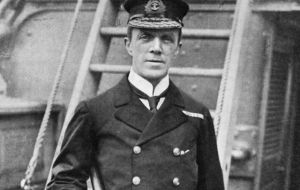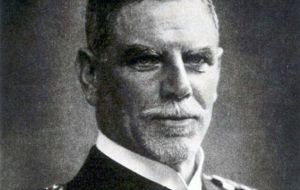MercoPress. South Atlantic News Agency
Anniversary ceremony of the 1914 Battle of the Falkland Islands
 The Battle of the Falkland Islands memorial in Stanley
The Battle of the Falkland Islands memorial in Stanley Falkland Islands will commemorate the 8th December 1914 Battle of the Falkland Islands with a talk on Wednesday and a full program next Saturday. This Wednesday at the Historic Dockyard Museum, David Bailey will be giving a talk on the Battle of Colonel, and of the Falkland Islands.
On Saturday 8th December, at 10.45 am a detachment of the Falkland Islands Defense Force and the Associations will march to the Battle Memorial. At 10.58am the Falklands' Governor will arrive at the Battle Memorial and will inspect the Parade. Youth Groups will be in attendance.
After prayers the Governor will lay a wreath, followed by MLA Roger Edwards, the Chief of Staff British Forces South Atlantic Islands, and representatives of the Royal British Legion and Associations.
The Falkland Islands elected government invites members of the public wishing to attend the ceremony and requests they arrive no later than 10.50 am.
After the ceremony there will be a march past. His Excellency the Governor, MLA Roger Edwards and the Chief of Staff, will take the Salute from a dais at the entrance gates to Government House lawns.
It is appropriate for decorations and medals to be worn on this occasion.
The Battle of the Falkland Islands followed German victory at Colonel in November, off the Chilean coast, with Admiral von Spee planning to destroy the British coaling station at Stanley. But the Germans found a much superior British force in the Falklands and within hours the flotilla had been sunk and Spee was dead.
As the Germans came in sight of Stanley on the morning of 8 December 1914, they quickly realized that they had sailed into trouble and turned away at full speed to try to escape. All too soon for the Germans, the British were leaving harbor and gathering speed to chase. Conditions were clear, and the British had most of the day to catch up. By early afternoon, Spee accepted escape was impossible and turned back with his two slower big ships, while ordering his three faster light cruisers to flee.
British Admiral Sturdee sent his five cruisers after the smaller German ships (two were sunk later and one escaped) and faced Spee with his two battle cruisers.
The British gunnery was poor, and the Germans maneuvered skillfully so that it took much of the afternoon before the British made telling hits. Eventually, however, the big British shells struck home. Both German armored cruisers were sunk before about 6:00 PM, with few survivors. The defeat at Coronel had been avenged—even the German escapee from the battle, Dresden, was caught and destroyed while hiding in Chilean waters three months later.
The Battle of the Falkland Islands has been called the most naval battle of the WW1, because it gave a great morale boost to the Allied war effort at a dire time, when the Allies were flailing on the Western Front and were about to get bogged down in Gallipoli.
Losses: British, 10 dead, 19 wounded, no ships sunk; German, some 2,000 killed, 215 captured, 6 ships sunk.
Until 14 June 1982, Liberation Day (from the Argentine military invasion), the 8th December Battle commemoration was the main date in the official Falklands' calendar.






Top Comments
Disclaimer & comment rulesCommenting for this story is now closed.
If you have a Facebook account, become a fan and comment on our Facebook Page!